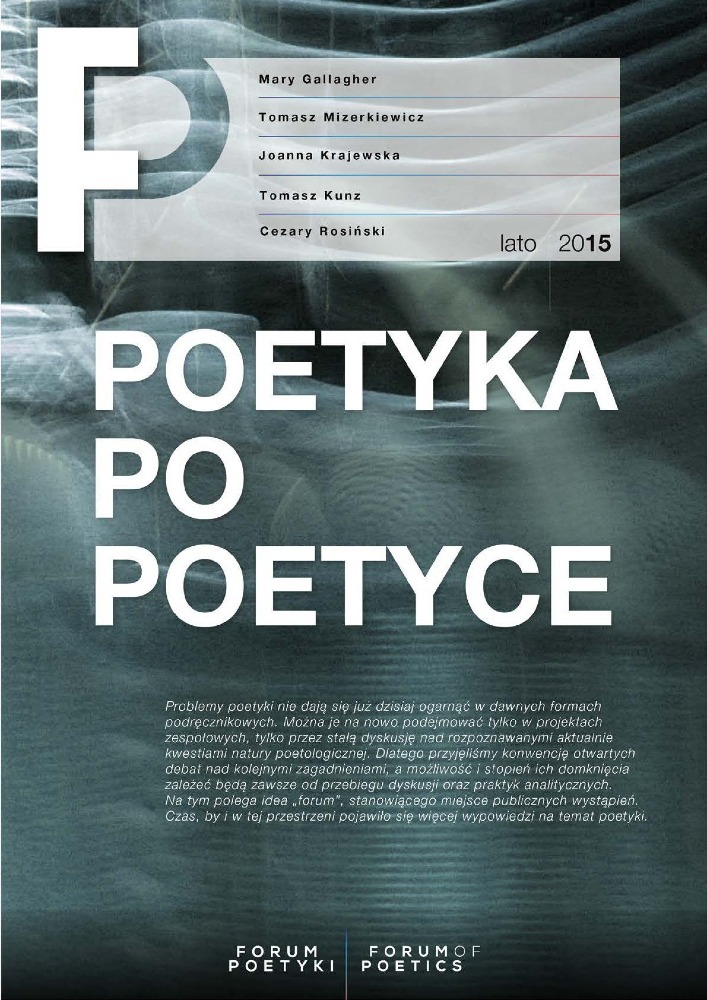Abstrakt
Prezentowany artykuł Mary Gallagher to fragment z książki o „pisaniu światowym” (World Writing. Poetics, Ethics and Globalization, ed. Mary Gallagher, University of Toronto Press, Toronto-Buffalo-London, 2008), w której pojawia się diagnoza dotycząca usytuowania poetyki w polu problemowym, tworzonym przez zagadnienia etyczne i polityczne widziane w kontekście procesów globalizacyjnych. W pierwszym dziesięcioleciu XXI wieku etyka, poetyka oraz a fortiori ich koniugacja z pewnością mogą się wydawać nieodwracalnie zdewaluowane. Oba dyskursy można uważać za nieco nie z tego świata, a ich transcendentny moralizm i estetyzm odpowiednio sprawiają nierozsądne, niemal szalone wrażenie w czasach, kiedy skonfliktowane bliźniacze skrajności relatywizmu i fundamentalizmu prowadzą do utraty cierpliwości i tak już dręczącej polityczny dyskurs. Można jednak postrzegać poetykę i etykę – zarówno zwrot etyczny, jak i lingwistyczny – jako świadków lub sumienie, a nie alibi polityki XXI wieku.
Bibliografia
Attridge, Derek, i Paweł Mościcki. Jednostkowość literatury. Kraków: TAiWPN Universitas, 2007.
Bachelard, Gaston. „Poetyka przestrzeni”. W Wyobraźnia poetycka: wybór pism, zredagowane przez Anna Tatarkiewicz. Warszawa: Państwowy Instytut Wydawniczy, 1975.
Bachelard, Gaston, i Leszek Brogowski. Poetyka marzenia. Gdańsk: Słowo/Obraz Terytoria, 1998.
Bachelard, Gaston, Henryk Chudak, Anna Tatarkiewicz, Jan Błoński, i Państwowy Instytut Wydawniczy. Wyobraźnia poetycka: wybór pism. Warszawa: Państ. Instytut Wydawniczy, 1975.
Badiou, Alain. Manifeste pour la philosophie. Paris: Éditions du Seuil, 1989.
Bongie, Chris. „Belated Liaisons. Writing between the Margins of Literary and Cultural Studies”. Francophone Postcolonial Studies, nr 1 (2) (2003).
Bongie, Chris. „Exiles on Main Stream: Valuing the Popularity of Postcolonial Literature”. pmc Postmodern Culture 14, nr 1 (2003).
Brennan, T. „World Music Does Not Exist”. Discourse : Berkeley Journal for Theoretical Studies in Media and Culture. 23 (2001): 44–62.
Britton, Celia. The Nouveau Roman: Fiction, Theory and Politics. Londyn: Macmillan, 1992.
Casanova, Pascale. Le republique mondiale des lettres. Paris: Editions du Seuil, 1999.
Clark, Timothy. Derrida, Heidegger, Blanchot: Sources of Derrida’s Notion and Practice of Literature. Cambridge; New York, NY, USA: Cambridge University Press, 1992.
Clark, Timothy. „Singularity in Criticism”. Cambridge Quarterly, nr 4 (33) (2004).
Connolly, William E. The Augustinian Imperative: A Reflection on the Politics of Morality. Newbury Park; London: Sage Publications, 1993.
Damrosch, David. What Is World Literature? Princeton, N.J.: Princeton University Press, 2003. http://search.ebscohost.com/login.aspx?direct=true&scope=site&db=nlebk&db=nlabk&AN=1836987.
De Man, Paul, i Artur Przybysławski. Alegorie czytania: język figuralny u Rousseau, Nietzschego, Rilkego i Prousta. Kraków: Universitas, 2004.
Dimock, Wai-chee. „Genre as World System: Epic and Novel on Four Continents”. Narrative Narrative 14, nr 1 (2006): 85–101.
Eskin, M. „On Literature and Ethics”. Poetics Today Poetics Today 25, nr 4 (2004): 573–94.
Hardt, Michael, Antonio Negri, Sergiusz Ślusarski, i Adam Kołbaniuk. Imperium. Warszawa: Wydawn. W.A.B., 2005.
Harrison, N. „Who Needs an Idea of the Literary?” PARAGRAPH -OXFORD THEN EDINBURGH- 28, nr 2 (2005): 1–17.
Hartman, Geoffrey H. The Fateful Question of Culture. New York: Columbia University Press, 1997.
Jameson, Fredric. „Modernism and Its Repressed: Robbe-Grillet as Anti-Colonialist”. Diacritics Diacritics 6, nr 2 (1976): 7–14.
Keenan, Thomas. Fables of Responsibility: Aberrations and Predicaments in Ethics and Politics. Stanford, Calif: Stanford University Press, 1997.
Krishnaswamy, R. „The Criticism of Culture and the Culture of Criticism: At the Intersection of Postcolonialism and Globalization Theory”. DIACRITICS 32 (2002): 106–26.
Miller, J. Hillis. The Ethics of Reading: Kant, De Man, Eliot, Trollope, James, and Benjamin, 1987. https://doi.org/10.7312/mill91042.
Moretti, F. „Conjectures on World Literature”. New Left Review., nr 1 (2000): 54–68.
Pecora, Vincent P. „Ethics, Politics, and the Middle Voice”. Yale French Studies, nr 79 (1991): 203–30.
Pickering, R. „Écrire sous l’Occupation: les «Mauvaises pensées et autres» de Valéry”. revuhistlittfran Revue d’Histoire littéraire de la France 88, nr 6 (1988): 1076–95.
Ray, S. „ETHICAL ENCOUNTERS: SPIVAK, ALEXANDER AND KINCAID”. CULTURAL STUDIES -ANDOVER- 17 (2003): 42–55.
Redfield, Marc, red. Theory, Globalization, Cultural Studies, and the Remains of the University. T. 3. Diacritics 31. Baltimore: The Johns Hopkins University Press, 2001.
Spivak, Gayatri Chakravorty. Death of a Discipline. New York: Columbia University Press, 2003.
Spivak, Gayatri Chakravorty. „Ethics and Politics in Tagore, Coetzee, and Certain Scenes of Reading”. Diacritics 32, nr 3/4 (2002).
Spivak, Gayatri Chakravorty. „Teaching for the Times”. W Dangerous Liaisons: Gender, Nation, and Postcolonial Perspectives, przez Aamir Mufti, Anne MacClintock, i Ella Shohat Ella, T. 11. Cultural Politics (University of Minnesota). Minneapolis: University of Minnesota Press, 1997.
Spivak, Gayatri Chakravorty. „World Systems & the Creole”. NARRATIVE -COLUMBUS OHIO- 14, nr 1 (2006): 102–11.
Szeman, Imre. „Culture and Globalization, or, The Humanities in Ruins”. CR: The New Centennial Review 3, nr 2 (2003): 91–115.
Valéry, Paul. „Mauvaises pensées”. W Oeuvres complètes, T. 2. Paris: Gallimard, 1960.
Young, R. J. C. „Ideologies of the Postcolonial”. INTERVENTIONS -LONDON- 1, nr 1 (wrzesień 1998): 4–8
Licencja
Za prawa cytowania fragmentów innych publikacji (tekstów, tabel, rycin oraz ilustracji) odpowiedzialni są autorzy artykułu.

